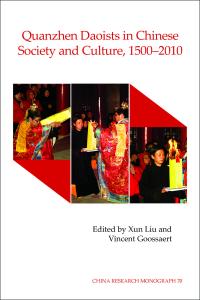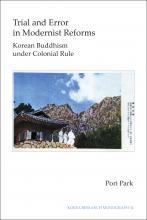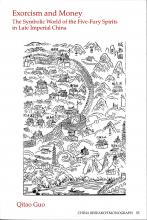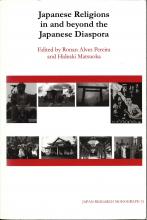Quanzhen Daoists in Chinese Society and Culture, 1500–2010
Quanzhen Daoists in Chinese Society and Culture, 1500–2010
Xun Liu, ed., Vincent Goossaert, ed.
Quanzhen Daoists in Chinese Society and Culture, 1500–2010 covers Quanzhen Daoism both as a historical phenomenon and a living religion. The contributors hope that the volume will serve as one of the first efforts in a Western language to advance and integrate the emerging field of Quanzhen Daoist studies with the larger field of modern Chinese studies.
As a nonprofit academic press, we need your support to publish our books. Your gift can help us make more of our titles available as e-books. DONATE NOW
Title information
This volume covers Quanzhen Daoism both as a historical phenomenon and a living religion. The contributors explore continuities and innovations in the realm of geneaological discourse, canonical compilation and transmission, and ritual codification. Also discussed is the relationship of Quanzhen Daoism, the state, and local society.
Contributors:
Vincent Durand-Dastès, Institut National des Langues et Civilisations Orientales, Paris
Monica Esposito, Institute for Research in Humanities, Kyoto University
Vincent Goossaert, Ecole pratique des hautes études
Stephen Jones, School of Oriental and African Studies, University of London
Fang Ling, Groupe Sociétés, Religions, Laïcités, CNRS-EPHE
Xun Liu, Department of History, Rutgers University
David A. Palmer, Department of Sociology, Hong Kong University
Paul G. G. van Enckevort, Institute for Area Studies, Leiden University
Richard G. Wang, Department of African and Asian Languages and Literatures, University of Florida
Mori Yuria, Asian Area Cultural Studies, Waseda University
Xun Liu, ed.
Xun Liu is professor of history at Rutgers University. His research addresses the history of Daoism and the impact of Daoists temples upon local culture and society. He is the author of Daoist Modern: Innovation, Lay Practice and the Community of Inner Alchemy in Republican Shanghai (2009) and coeditor of Quanzhen Daoists in Chinese Society and Culture, 1500–2010 (IEAS, 2013).
B.A., Huazhong Normal University; Ph.D., University of Southern California
Vincent Goossaert, ed.
Vincent Goossaert is professor of history at École Pratique des Hautes Études (EPHE) and serves as deputy director of Groupe Sociétés, Religions, Laïcités (GSRL). He works on the social history of modern religions in China. His coedited volumes include The Religious Question in Modern China (2011) and Quanzhen Daoists in Chinese Society and Culture, 1500-2010 (IEAS, 2013).
B.A., École des Hautes Études Commerciales (HEC); M.A., Université Paris 4 DEA, Sciences Religieuses, École Pratique des Hautes Études (EPHE), Paris; Ph.D., Sciences Religieuses, EPHE, Paris
Quanzhen Daoists in Chinese Society
Contributors – ix
Acknowledgments – xi
Conventions – xiii
Introduction – 1
Xun Liu and Vincent Goossaert
Part 1. Making Quanzhen Identities
1. Quanzhen, What Quanzhen? Late Imperial Daoist Clerical Identities in Lay Perspective – 19
Vincent Goossaert
- 2. The Invention of a Quanzhen Canon: The Wondrous Fate of the Daozang jiyao – 44
Monica Esposito - 3. A Late Qing Blossoming of the Seven Lotus: Hagiographic Novels about the Qizhen – 78
Vincent Durand-Dastès - 4. Globalizing Daoism at Huashan: Quanzhen Monks, Danwei Politics, and International Dream Trippers – 113
David A. Palmer - Part 2. Quanzhen Textual and Ritual Productions
- 5. Quanzhen and Longmen Identities in the Works of Wu Shouyang – 141
Paul G. G. Van Enckevort - 6. Being Local through Ritual: Quanzhen Appropriation of Zhengyi Liturgy in the Chongkan Daozang jiyao – 171
Mori Yuria - 7. Quanzhen Daoism and Ritual Medicine: A Study of "Thirteen Sections of Zhuyou Medicine from the Yellow Emperor Inscription" – 208
Fang Ling - Part 3. Quanzhen Daoists and Local Society
- 8. A Local Longmen Lineage in Late Ming–Early Qing Yunnan – 235
- Richard G. Wang
- 9. Quanzhen Proliferates Learning: The Xuanmiao Temple, Clerical Activism, and the Modern Reforms in Nanyang, 1880s–1940s – 269
Xun Liu - 10.Temple and Household Daoists: Notes from North China – 308
Stephen Jones
Bibliography – 335
Index – 369
|
JOURNAL REVIEWS |
|
“The volume reads like a lively and always precise introduction to the social and cultural role that religious figures and traditions played in late imperial and modern China. Quanzhen presence is shown to have been overwhelming. This is explained by Gossaert’s [sic] intriguing list of this group’s multiple identities….The volume is an essential contribution to the history of religion in China, on methodological grounds, documented in particular in the introduction, and because of its wealth of materials.” ~Barbara Hendrischke, University of Sydney, in Religious Studies Review 41, no. 3 (September 2015): 127. (http://onlinelibrary.wiley.com/doi/10.1111/rsr.12241_5/full) |
|
“This detailed work is aimed at specialists in the field but also at a wider intellectual audience interested in Chinese society as a whole and the complex religious landscape that in part defines it. It will doubtless become a precious manual for university students of religious studies and Chinese history….One major appeal of the work is that, through variations in approach, scale and perspective (historical, Sinological, sociological, and anthropological), it succeeds in demonstrating that Quanzhen has not been a homogeneous category in time or space.” ~Adeline Herrou, Centre National de la Recherche Scientifique, Laboratoire d’Ethnologie et de Sociologie Comparative (France), in Daoism: Religion, History and Society, no. 8 (2016): 294–309 |




